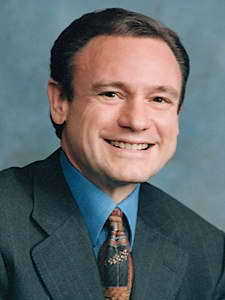Has the U.S. economy turned a corner, and how is the Obama Administration handling the nation’s economic conditions? Dr. Ray Perryman, economist and founder and President of The Perryman Group, offered his take when he spoke with The Marist Poll’s John Sparks. Read the interview transcript below.
John Sparks
Ray, in our most recent survey, 52% of the American public told The Marist Poll that they approve how President Obama is handling the economy. This is right on the border of being a majority, given the margin of error, so it’s sort of teetering at the midway point. How do you perceive that the Obama administration is handling the economy right now?
Ray Perryman
Well, it certainly hasn’t been perfect, but I think they’ve done a good job, and I would have been among your 52% if I would have been in the survey. They inherited some significant problems and took some bold actions. Like a lot of actions that happened with the economy, they get bogged down in bureaucracy. They don’t always move as fast as you would like them to through no fault of anyone. It’s just the nature of the system as it exists today, but on balance, I think the administration’s done a good job.
John Sparks
Now, it’s interesting you mentioned…your belief that he inherited the current economic conditions. In fact, we did poll the public as well, and 74% of the American public told us that they, too, believe that he inherited the current economic conditions, and they are not a result of his own policies. So, I take it that you agree that the problems have been inherited, but when do you think that it will become his problem? In other words, just how patient do you think the American public will be with the president in solving our current economic woes?
Ray Perryman
Well, there’s certainly a lot of people on the other side and a lot of people in various media outlets trying to make it his issue. In fact, even before he was sworn in, some of them were calling it the “Obama Recession,” but I think people do recognize that the seeds of this go way back. A lot of it did happen in President Bush’s administration, but some of it, even the seeds of this were planted in President Clinton’s administration, so it’s not something that happened overnight. It took a series of events and eventualities to make it happen, and a lot of people besides presidents were involved in it. I hope the American people continue to recognize this, but I feel fairly sure over time that number will diminish as people’s memories are just really short on these things.
John Sparks
The mid-term elections will probably be a definitive report card on how the people feel the administration has been handling the economy. Do you have any predictions, if things continue as they are, what we may see next November?
Ray Perryman
Well, I’m not a political forecaster. I’m an economist. But, just making the observations just of what you typically see, you typically see the party out of power make some gains in the mid-term elections. It’ll be interesting to see exactly where the economy is as those elections approach, because if the recovery is in pretty good form, it may work well for the incumbents and the parties in power, but if there’s rising concern about deficits and maybe the economic recovery is not as fast, it’ll favor the ones out of power. I think the stars will add up pretty well for the incumbent, given where I think the economy will be at that time, but nonetheless, I’d be surprised if you didn’t see some attrition just because that’s the typical situation.
John Sparks
50% of the public told us that they believe things are going in the right direction. Now, that certainly is not a vote of confidence. What will it take for folks to believe that we are really, truly headed in the right direction?
Ray Perryman
Oh, I think as much as anything, it’ll take getting some jobs out there, because if people really focus on that, their job security, that’s very important to people. Their stock market is going back up some and the retirement funds and their savings and their pensions gaining some ground back would also help, although a gross domestic product is one thing, and that’s how we measure the economy. For most individuals, they measure the economy based on their own personal situation, and they’re going to have to fill pretty good about job prospects, their own job, jobs of their friends and neighbors and their retirement plans and the things that affect their daily lives, before I think you see that number go up a great deal.
John Sparks
It’s interesting you mention the gross domestic product. I saw another survey that was taken among private economists that was released this week. It indicated that about 90% of them believe that the recession will probably end in the third quarter, and they cited data showing that the gross domestic product was contracting at about a 1% rate compared to around 6.4% in the first quarter. Housing and labor market indicators also suggest we may be turning the corner. Do you think that’s truly the case that we are indeed turning that corner?
Ray Perryman
I think we are. I was one of the first to say I thought we’d see growth in the third quarter this year. I was saying that in the fourth quarter of last year, and I think that it’s still likely we are likely to see that. And, some of the other indicators are telling us the kinds of things that tells us in a recovery — productivity is going up which typically happens as production goes up and people keep the work force pretty steady. And, the inventory numbers are dropping a little bit which means that shelves are getting cleaned out. So, there’s a lot of things telling us we’re in the early stages of an economic recovery right now. Again, the difficulty with that is while those are the official numbers, those are what folks like myself focus on. The average individual doesn’t see the gross domestic product. What they see is their own retirement account, their own job prospects and things of that nature.
John Sparks
I think most of us want to believe that we’ve bottomed out and that we’re slowly starting to turn things around, but I said slowly, and there are marked differences in the speed and strength of a recovery, and in this poll that I cited among the private economists, 17% believe it’ll be a V-shaped rebound. And, yet two-thirds believe there’s more likely to be a W-shaped bounce-back with ups and downs along the way. What do you see, and what are folks telling you?
Ray Perryman
Well, what we’re showing is: I don’t think you’ll see a lot of the W in the sense of the gross domestic product fluctuating from positive to negative territory which is how we usually define the so-called “W” recoveries. I think you’re likely to see the momentum be fairly slow at first, what we call a U-shaped recovery, that is a fairly flat bottom for awhile, but then, once it starts coming back, I’ll think you’ll see a lot of momentum getting into it… I would say this one is going to be sort of a modified U-V. It’s going to be a U-shaped at first, but then we’re going to see a pretty steep comeback a few months down the road.
John Sparks
Now, you mentioned a moment ago, joblessness, and of course, the largest concerns are still concerning jobs, and the joblessness is predicted to peak about 10% this year. What do you see on the horizon for the strength of the American workforce? … What do you think we’re likely to see in the next 12 months?
Ray Perryman
The things you’re likely to see in the next 12 months will be an improvement in the job market, but it’s not likely to happen for a few months. We’re still going to see job losses for the next few months. Hopefully, they will be at a slower pace. We’ve been seeing that. We’re losing 500,000- 600,000 jobs a month earlier in the year. We’re now losing 250,000 jobs in the most recent month. That’s a marked improvement, but it’s a marked improvement in how fast things are going down, and I think it’ll be a few months before you see that turn around. But, in the next year, I think you will start seeing the job market gain momentum. What normally happens is people try to use their existing workforce a lot before they start rehiring as a new recovery starts, simply because they’ve been through a rough time. They don’t want to rehire prematurely. So, they’ll push their workforce as hard as they can. That’s why you’re seeing the productivity numbers starting to tick-up quite a bit in the recent statistics. Right now, the average work week in this country is somewhere around 33 – 34 hours. During the last recession, it got up ahead of 40 hours before you saw a lot of rehiring. So, we have a ways to go before you really see the labor market picture pick up, but it will be looking a lot better this time next year.
John Sparks
Energy prices always have a tremendous impact on all aspects of our economy. Oil is on the upswing again. What kind of impact is that going to have on our economy in the next 12 months?
Ray Perryman
Well, oil prices are up right now, because world demand is beginning to bottom out and come up a little bit, but also simply because of the phenomenon with the dollar. Because oil is priced in dollars, that can cause movement in oil prices. I think the oil prices will probably be somewhat high coming out of the recession, moving into the recovery phase. But, natural gas prices, a lot of other fuel prices will still be lower, because they’re traded on national rather than global markets. They’re not subject to as much speculation, and there’s some excess supply there. So, I think some aspects of the energy market, you’ll be seeing higher prices, but I think a big chunk of the energy market will probably have sluggish pricing for quite some time.
John Sparks
How do you see the stock market responding to all these factors in the next 12 months?
Ray Perryman
Well, the stock market will be something of a leading indicator, and it’s beginning to sort of see some signs of light and react to those. So, it will be volatile because we’re going to continue to see for a long time, a mixture of numbers. One day, the numbers will point in one direction and the next day, the numbers will point in another direction. It’s going to react to the health care debate. It’s going to react to all kinds of things as the next year unfolds. So, I think you’ll see a lot of volatility, but we should see an upward trend, simply because earnings prospects are going to improve, long-range prospects, I think, people perceive them to be better, and that’s really what the ultimate underlying price of stocks is all about.
John Sparks
Thanks so much, Ray, I appreciate your time.
To learn more about Dr. Ray Perryman, visit The Perryman Group’s website by clicking here!
** The views and opinions expressed in this and other interviews found on this site are expressly those of the speakers or authors and do not necessarily reflect the views of The Marist Poll.
Related Stories:
8/12: Obama Approval Rating 55% … Loses Majority of Independents


